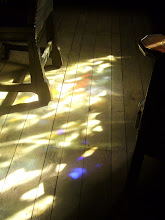Then I went to a Christian college where it was pretty much the same. I was rarely doubted or made to feel inferior, never condescended to because of my idealism or innocence. I just thought that innocence--voluntary innocence, I mean, the innocence that you choose even though you know how ugly the world can be--would be respected and appreciated.
And then I joined the real world. I have never in my life felt so young. When my new co-workers found out my age, they actually laughed. They make sure I know that I am a cute little girl. I get to hear about their breakups and divorces, their failed dreams, their bitter disregard for any possibility of kindness. And I feel how young I am, how trusting and sincere. And how little value the world sees in those qualities.
I'm not an oblivious little angel--I mean, I'm a little theologically and politically liberal; people don't apologize when they swear in front of me anymore (for which I'm very grateful); I'm not blind to how horrible life can be--but I do still think of myself as very innocent, and I don't see anything wrong with it. I don't trust the government; I'm scared to leave my apartment at night; I give all strange men the "I'm a bitch--don't even look at me" vibe whenever necessary. But I still trust people; I still believe that there are things like goodness and mercy, hospitality, community, honesty, integrity.
I was crushed this week when I had a traumatic dentist visit. I unthinkingly expected the dentist to do her job and to treat me like a human being; she did neither. I wasn't really as horrified by the gigantic hole she left in my tooth as by her uncaring and thoughtless conduct towards me. I complained about it to someone I work with and was told, "You're young. You're naive." And she's right. I was horrified by this experience because I deeply believe that people in the medical profession should care about their patients more than their pay checks.
Mostly though, I realize this difference between myself and others when it comes to love. I married a kind, thoughtful, gentle man who adores me. I believe in love; I believe in marriage forever; I believe that it is possible to share your life with one person as long as you live. I've also only been married for 6 months. I don't share these opinions at work because I know what I'll hear: "You're young. You're naive. Just give it a few years."
So often, the young ones are the wise ones. The ones who know how to live. If being a woman of the world means being bitter and burned-out, you can forget it. I'll take childlike innocence any day. I wrote an essay about my summer camp kids for a writing class last semester, which I think sums this whole discussion up nicely. Here's a little piece of it:
They teach me to live a freer, closer, kinder life—closer to the small things, more aware of the vast expanse of being; they show me how to care about rocks and leaves and spider webs; to be curious; to be struck with awe at the world. They remind me of the great wonder that is a human soul, remind me with their fragile, tremulous personalities that life is precious, beautiful, and a gift, even when it’s difficult. I no longer look back at my own childhood with nostalgia, mourning the loss of my innocence; in these children I’ve found a second innocence, a holy wonder I can only call grace. I find myself talking to flowers and stars, greeting the moon each night, finding joy in ladybugs and lizards and tales of dragons, in the feel of sunshine on my skin, the touch of another person’s hand, the sight of water pooled in droplets on the grass and trees after rain… My summer camp kids have helped me to see and to love these things, and to live as they do—simply, sweetly, with eyes like a little child’s.
There is a writer who talks about the second innocence--Annie Dillard? I can't remember. It's a chosen innocence, not even one you're born with. It's a choice to keep yourself unsullied; to live outside of the greed and the selfishness and the bitterness that make up most adults' lives. It doesn't mean you don't see the world's pain, its destructive sin, the possibility that it will chew you up and spit you out. You see that, but you choose to live inside of a greater truth. You choose grace, mercy, kindness, a life in the spirit. You choose to hope, to trust, and to love.Perhaps innocence is wisdom after all.

